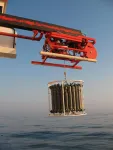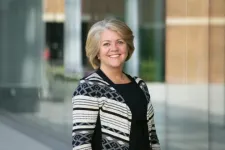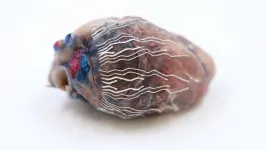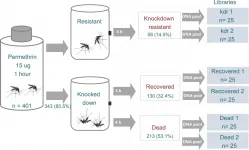Sulfur enhances carbon storage in the Black Sea
Study finds new explanation for the accumulation of organic compounds in oxygen-depleted marine areas
2021-06-17
(Press-News.org) The Black Sea is an unusual body of water: below a depth of 150 metres the dissolved oxygen concentration sinks to around zero, meaning that higher life forms such as plants and animals cannot exist in these areas. At the same time, this semi-enclosed sea stores comparatively large amounts of organic carbon. A team of researchers led by Dr Gonzalo V. Gomez-Saez and Dr Jutta Niggemann from the University of Oldenburg's Institute for Chemistry and Biology of the Marine Environment (ICBM) has now presented a new hypothesis as to why organic compounds accumulate in the depths of the Black Sea - and other oxygen-depleted waters in the scientific journal Science Advances.
The researchers posit that reactions with hydrogen sulfide play an important role in stabilizing carbon compounds. "This mechanism apparently contributes to the fact that there is more than twice as much organic carbon in the waters of the Black Sea as in oxygen-rich marine areas," says Niggemann. "This provides a negative feedback in the climate system that could counteract global warming over geological periods."
In the Black Sea, which covers an area almost twice the size of France, conditions rarely found in other marine regions have prevailed for around 7,000 years: stable stratification largely prevents the mixing of surface and deep waters. The water in the upper 150 metres is low in salt and oxygen-rich, and comes mainly from rivers like the Danube. Below that, there is a layer of higher density saline water that flows into the Black Sea from the Mediterranean via the Bosporus.
"When you open a water sample from the deeper areas of the Black Sea, the smell of rotten eggs almost knocks you over," Niggemann says. On the surface, however, there is no indication that the Black Sea is a stagnant body of water in which, due to the lack of oxygen, bacteria produce foul-smelling hydrogen sulfide.
Hydrogen sulfide reacts with dissolved organic matter
As the new study shows, this highly reactive molecule binds with substances from a diverse group of carbonaceous materials that are present in every litre of seawater. These substances are known as dissolved organic matter (DOM) - a complex mixture of countless different molecules that are the product of decomposed organic matter or bacterial metabolic processes.
"We were able to show very clearly that hydrogen sulfide reacts with the extremely diluted organic matter directly in the water," Niggemann explains. The products of the reaction are potentially more durable than the starting materials and therefore accumulate in the water.
The team compared water samples from different locations in the Black Sea and other seas and rivers. Using various analytical methods, including the ultrahigh resolution mass spectrometer of the Marine Geochemistry research group at the University of Oldenburg, the researchers were able to characterize the dissolved organic matter in detail.
They found that almost a fifth of the organic molecules in the anoxic areas of the Black Sea contained sulfur - significantly more than in other seas. In addition, the team was able to establish that a high proportion of these compounds are only found in these areas, leading the researchers to conclude that the sulfur compounds form there through chemical reactions in the sulfidic water.
Negative feedback relevant on geological time scales
Given that huge amounts of carbon are stored in dissolved organic matter - the world's oceans contain roughly as much dissolved organic carbon as there is CO2 in the Earth's atmosphere - the results of this new study are also relevant for the climate. "The volume of ocean waters completely depleted of oxygen quadrupled between 1960 and 2010.
Consequently, this sulfur-based mechanism of carbon storage could influence the chemistry of the oceans in the future," says Gomez-Saez, the lead author of the study. But this negative feedback is too weak to have a noticeable impact on climate change under the current conditions, he adds. In geological history, however, there have been several periods during which large areas of the oceans were oxygen-deficient. During these periods this effect could have contributed to long-term removal of carbon dioxide from the atmosphere.
The water samples from the Black Sea were taken during an expedition with the research vessel Maria S. Merian. In addition to the team from the ICBM, researchers from the Alfred Wegener Institute, Helmholtz Centre for Polar and Marine Research (AWI) in Bremerhaven, the MARUM - Center for Marine Environmental Sciences of the University of Bremen, and the Max Planck Institute for Marine Microbiology in Bremen participated in the study.
INFORMATION:
[Attachments] See images for this press release:

ELSE PRESS RELEASES FROM THIS DATE:
2021-06-17
New Brunswick, N.J. (June 17, 2021) - Babies born by cesarean section don't have the same healthy bacteria as those born vaginally, but a Rutgers-led study for the first time finds that these natural bacteria can be restored.
The study appears in the journal Med.
The human microbiota consists of trillions of bacteria, viruses, fungi and other microorganisms - some beneficial, some harmful -- that live in and on our bodies. Women naturally provide these pioneer colonizers to their babies' sterile bodies during labor and birth, helping their immune system to develop. But antibiotics and C-sections disturb this passing of microbes and are related to increased risks of obesity, asthma and metabolic ...
2021-06-17
Woodlands along streams and rivers are an important part of California's diverse ecology. They are biodiversity hotspots, providing various ecosystem services including carbon sequestration and critical habitat for threatened and endangered species. But our land and water use have significantly impacted these ecosystems, sometimes in unexpected ways.
A team of researchers, including two at UC Santa Barbara, discovered that some riparian woodlands are benefitting from water that humans divert for our own needs. Although it seems like a boon to these ecosystems, the artificial ...
2021-06-17
SAN ANTONIO (June 17, 2021) -- Middle-aged people with depressive symptoms who carry a genetic variation called apolipoprotein (APOE) ε4 may be more at risk to develop tau protein accumulations in the brain's emotion- and memory-controlling regions, a new study by researchers from The University of Texas Health Science Center at San Antonio (UT Health San Antonio) and collaborating institutions suggests.
The Journal of Alzheimer's Disease published the findings in its June 2021 print issue. The research is based on depression assessments and positron emission tomography (PET) imaging conducted among 201 participants in the multigenerational Framingham Heart Study. The mean age of these participants was 53.
Decades before diagnosis
PET scans typically are conducted ...
2021-06-17
LOS ALAMOS, N.M., June 17, 2021 -- A research team from Los Alamos National Laboratory and Purdue University have developed bio-inks for biosensors that could help localize critical regions in tissues and organs during surgical operations.
"The ink used in the biosensors is biocompatible and provides a user-friendly design with excellent workable time frames of more than one day," said Kwan-Soo Lee, of Los Alamos' Chemical Diagnostics and Engineering group.
The new biosensors allow for simultaneous recording and imaging of tissues and organs during surgical procedures.
"Simultaneous recording and imaging could be useful during heart surgery in localizing critical regions and guiding surgical interventions such as a procedure for restoring normal ...
2021-06-17
Nanodecoys made from human lung spheroid cells (LSCs) can bind to and neutralize SARS-CoV-2, promoting viral clearance and reducing lung injury in a macaque model of COVID-19. By mimicking the receptor that the virus binds to rather than targeting the virus itself, nanodecoy therapy could remain effective against emerging variants of the virus.
SARS-CoV-2 enters a cell when its spike protein binds to the angiotensin-converting enzyme 2 (ACE2) receptor on the cell's surface. LSCs - a natural mixture of lung epithelial stem cells and mesenchymal cells - also express ACE2, making them a perfect vehicle ...
2021-06-17
Current approaches for planning relocation for potentially millions of people affected by climate change and related risks are "woefully inadequate" and risk worsening societal inequities, experts wrote in a policy perspective on June 17 in Science. Policymakers and scientists need to rethink how they work together to develop, communicate and carry out relocation plans.
"Relocation involves moving people away from risk and into totally new settings," said the team of experts led by Richard Moss. Moss is a Gerhard R. Andlinger Visiting Fellow at Princeton's Andlinger Center ...
2021-06-17
The Yellow fever mosquito (scientific name, Aedes aegypti) spreads multiple untreatable viruses in humans and is primarily controlled using a pesticide called permethrin. However, many mosquitoes are evolving resistance to the pesticide. A new study by Karla Saavedra-Rodriguez of Colorado State University and colleagues, published in the journal PLOS Genetics, identifies mutations linked to different permethrin resistance strategies, which threaten our ability to control disease outbreaks.
When treated mosquitoes encounter permethrin in the wild, they will do one of the following: immediately die, be knocked out but recover, or be unaffected. Saavedra-Rodriguez and her colleagues decided to investigate the genetic variations that lead to these ...
2021-06-17
A new treatment approach focused on fixing cell damage, rather than fighting the virus directly, is effective against SARS-CoV-2 in lab models.
Combination of two drugs reduces spread of SARS-CoV-2 infection in cells by up to 99.5%.
If found safe for human use, this anti-viral treatment would make
COVID-19 symptoms milder and speed up recovery times.
When a person is infected with SARS-CoV-2, the virus that causes COVID-19, it invades their cells and uses them to replicate - which puts the cells under stress. Current approaches to dealing with infection target the virus itself with antiviral drugs. But ...
2021-06-17
Patents with all-female inventor teams are more likely than all-male teams to address problems that specifically or disproportionately affect women, according to a new study. The findings, derived from an analysis of more than 440,000 U.S. biomedical patents filed from 1976 to 2010, suggest that who benefits most from innovation largely depends on who gets to invent. While the gender gap in research and innovation is well known, its broader impact on what gets invented - and for whom - isn't well understood. To address this question, Rembrand Koning and colleagues used machine learning text analysis to evaluate all U.S. biomedical patents filed from 1976 to 2010. They found that patents ...
2021-06-17
Daunting and uncertain is the future for people who must decide whether, where, when, and how to vacate their homes as the climate changes. Communities who will absorb this influx of uprooted people also face challenges. In a special issue of Science, "Fallback Strategies: Planning for Climate-Induced Relocation," experts examine ways in which interdisciplinary basic and applied research can - and must - engage with and support communities and governments navigating this landscape. As this work is done, "we must consider not only what science can do, but how science ...
LAST 30 PRESS RELEASES:
[Press-News.org] Sulfur enhances carbon storage in the Black Sea
Study finds new explanation for the accumulation of organic compounds in oxygen-depleted marine areas




